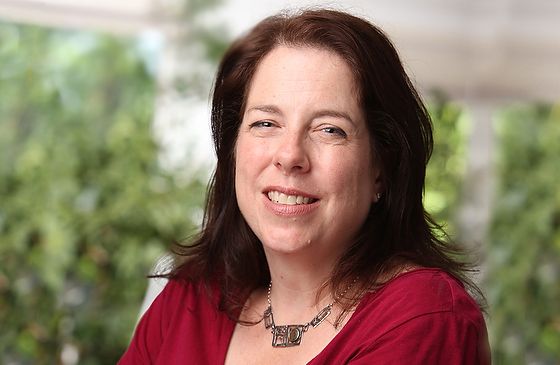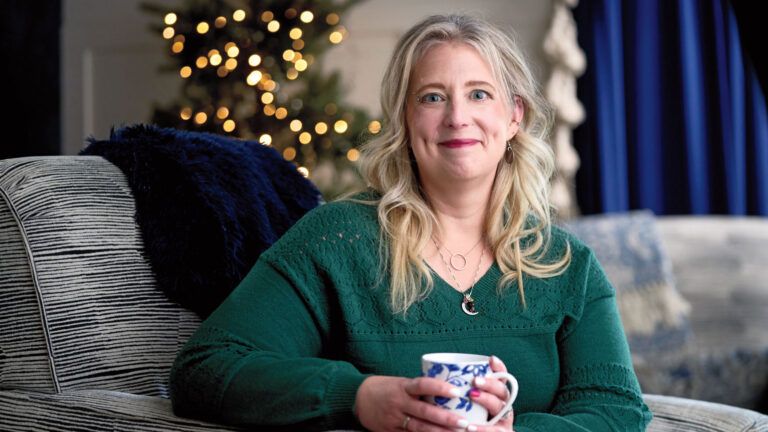Sitting in our rabbi’s study, my husband and I looked at our soon-to-be-13-year-old son and then at each other, exchanging proud glances.
For months he had been preparing, memorizing the Hebrew words and ancient melodies he’d use to recite from the Torah for his Bar Mitzvah, the ceremony that would mark his passage into Jewish adulthood.
We couldn’t wait to stand beside him on the bimah—the raised platform at the front of the sanctuary—give him our blessing and listen with the congregation as he read from the sacred scrolls.
Now, though, he seemed anxious about something. The rabbi noticed. “What is on your mind?” he asked.
My son leaned in and whispered, “Will there be tissues for my mom?”
My husband stifled a laugh. The rabbi smiled. “Yes,” he replied. “You know, it’s okay to cry on the bimah. Your mom won’t be the first mother who gets emotional at her child’s Bar Mitzvah.”
“Uh-huh,” my son said. I knew what he was thinking. I was going to be the most embarrassing mother ever. “Emotional” was one thing…but when I cry, it isn’t just a tear or two, or an elegant trickle. It’s more like the biblical flood. Rivers cascade down my cheeks, my nose runs, my face gets red and blotchy.
I can’t help it. I am a crier. I cry when I’m happy. I cry when I’m sad. I cry at good news and bad news. I even cry at commercials. My shaking and loud sobs when something on TV set me off made my kids squirm.
And that was in private. This would be in front of our family and friends, our entire congregation. I didn’t want my tears to ruin my son’s big day. Everyone should be focused on him, not me.
There in the rabbi’s study I decided I was going to beat this thing. There’s no crying at Bar Mitzvahs! At least not my son’s. Not by me.
One friend suggested beta-blockers. I don’t react well to medication, so no thanks. Another said I should stretch like an athlete before a big game. I couldn’t see how that would do anything but wrinkle my outfit.
I tried to set my emotions aside and think rationally. I’m a fund-raising director for a nonprofit organization, and before any presentation I always rehearse. Why couldn’t I approach reading my blessing like I was speaking before a group of donors? I didn’t cry then, after all.
Our cantor asked us to come in the week before the Bar Mitzvah for a dress rehearsal. Perfect! We assembled on the bimah.
“Before we begin,” she said, “I want you to think about the loved ones in your lives who will not be at this celebration with you, your ancestors whose lives set the stage for yours.” My chin quivered. “Remember how their love is carrying you through to this moment.”
I tried to focus on anything other than what the cantor was telling us to focus on. But then my son began reading his Torah portion. I couldn’t hold back anymore.
Tears rolled down my cheeks. I gasped and blew my nose as I fled to the bathroom to splash water on my face. I couldn’t even get through the rehearsal. How would I get through the real thing?
“Your tears are a gift of grace,” the cantor told me when I returned. To me, they felt more like an affliction.
The next few days I stood in front of my bedroom mirror, going over, line by line, the two-minute blessing I was to recite. When my eyes began to water, I steadied myself before going on.
The morning of the Bar Mitzvah, I woke up extra early and read the blessing over until I could get through the entire thing without crying. They’re just words, I told myself. You can turn off the tears for the big moment.
At the synagogue we settled into our seats in the front row of the sanctuary. I was fine during the early part of the service. Then the rabbi called my son to the Torah for the first time, in an ancient chant reminding us of our obligation to nurture and pass down Jewish traditions from one generation to the next.
My husband and I followed him up the steps to the bimah.
Just like you rehearsed, I commanded myself. Don’t cry.
“My blessing for you is that you allow yourself the freedom to try new things,” I began. “May you feed your soul and share your sharp mind and kind heart…” I paused. These weren’t just words. This was an act of deep meaning. To me, my son, our family, our people.
Here before the ark holding the Torah scrolls, I felt that so strongly. I looked at my boy, proud of the hard work he’d put in, aware of how our ancestors had fought to maintain our way of life and bring us to this moment. The same power that sustained them was sustaining me now, as I blessed my child.
Not a child. A man. My knees knocked, my hands shook. But I recited the rest of the blessing smoothly, stumbling only on the very last words. I looked out at the congregation. My friends were waving, giving me a silent salute.
Only after my son finished his Torah portion—flawlessly—and I sat back down, did the tears come. I wasn’t embarrassed. I finally understood what the cantor meant.
Crying was an overflowing of the love I hold in my heart. A gift of grace. Because when we experience something wonderful, we’re meant to feel it. Some of us just need to keep tissues handy.
Download your FREE ebook, A Prayer for Every Need, by Dr. Norman Vincent Peale





